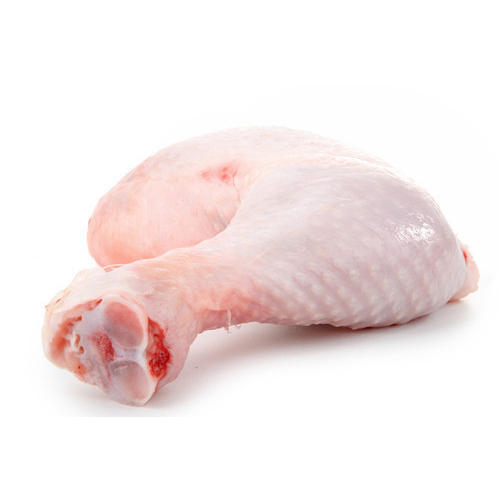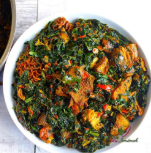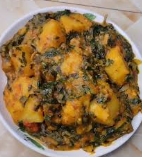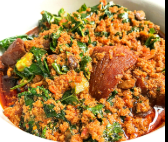| Weight | 1kg |
|---|
Only logged in customers who have purchased this product may leave a review.
Shoko -per pack (Subscriber price only)
Description
Shoko, also called Lagos spinach or celosia leaves, is a traditional Nigerian leafy vegetable native to tropical Africa. It is widely grown in Nigeria, particularly in the Southwest, and is prized for its slightly bitter taste which mellows when cooked.
Sources
Lagos, Ogun, Oyo, Osun, and Ondo states.
Health benefits
-
Rich in antioxidants – helps fight free radicals and support cell health.
-
High in vitamin C – boosts immunity and promotes wound healing.
-
Good source of folate – important for red blood cell production and pregnancy health.
-
Contains iron – supports blood health and energy levels.
-
Aids digestion – thanks to its dietary fiber content.
Common soups you can use it for
-
Efo Riro (traditional Yoruba vegetable stew)
-
Efo Shoko (Shoko-based vegetable sauce)
-
Egusi Soup (melon seed soup with greens)
-
Ogbono Soup
-
Okra Soup
Okasi (Afang Leaves) – per pack (Subscriber price only)
Description
Okasi, also called Afang leaves, is a popular leafy vegetable native to the Efik and Ibibio people of Southern Nigeria. It is a tough, slightly bitter leaf often sliced thinly and combined with waterleaf to balance its flavor and texture. Afang leaves are traditionally used in thick, hearty soups and are well-known for their rich, earthy taste.
Sources
Akwa Ibom State, Cross River State, and parts of Rivers State.
Health benefits
-
Rich in dietary fiber – aids digestion and supports gut health.
-
High in protein for a leafy vegetable – supports muscle repair and growth.
-
Contains essential minerals like calcium and magnesium – promotes strong bones and teeth.
-
Rich in antioxidants – helps protect the body from oxidative stress.
-
Boosts iron levels – supports red blood cell production and prevents anemia.
Common soups you can use it for
-
Afang Soup (Efik/Ibibio specialty)
-
Edikang Ikong Soup
-
Vegetable Okra Soup
-
Mixed Vegetable Soup with assorted meats and fish
Uziza -per pack(Subscriber price only)
Description
Uziza (Piper guineense) is a fragrant, peppery leaf and seed plant native to West Africa. The leaves have a slightly bitter and spicy taste, while the seeds are pungent with a distinct aroma. In Nigerian cooking, the leaves are used fresh or dried to add depth and spice to soups and stews.
Sources
Primarily cultivated in Southeastern Nigeria, especially in states like Enugu, Abia, Imo, Anambra, and Ebonyi.
Health benefits
-
Aids digestion – helps relieve constipation and bloating.
-
Anti-inflammatory – soothes body pains and inflammation.
-
Boosts immunity – contains vitamins, minerals, and essential oils that fight infections.
-
Improves reproductive health – traditionally believed to boost fertility and sexual health.
-
Rich in dietary fiber – supports gut health.
Common soups you can use it for
-
Nsala Soup (White Soup)
-
Oha Soup
-
Pepper Soup
-
Egusi Soup (especially the Southeastern variation)
-
Okra Soup with mixed leaves
Ugwu- per pack (Subscriber price only)
Description
Ugu (Telfairia occidentalis), known as fluted pumpkin leaves, is one of Nigeria’s most popular and nutritious vegetables. The leaves are tender, slightly sweet, and have a rich green color, often used fresh in soups, stews, and sauces. The seeds of the plant are also edible and can be roasted or used in traditional meals.
Sources
Edo, Delta, Anambra, Imo, Enugu, and Cross River states.
Health benefits
-
Rich in iron – helps prevent and treat anemia.
-
High in vitamins A and C – supports vision, skin health, and boosts immunity.
-
Good source of calcium – strengthens bones and teeth.
-
Improves blood production – boosts hemoglobin levels.
-
Supports reproductive health – traditionally believed to enhance fertility.
Common soups you can use it for
-
Edikang Ikong Soup
-
Egusi Soup
-
Vegetable Soup (mixed leaves)
-
Ogbono Soup
-
Okra Soup
















Reviews
There are no reviews yet.